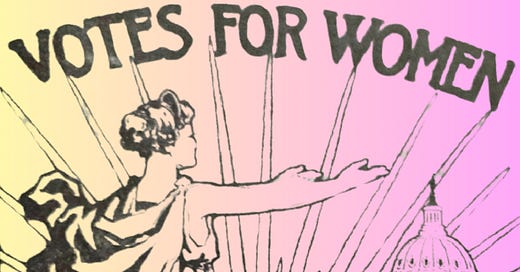The SAVE act will disenfranchise women
It took a long time for women to win the vote. Let's not lose it now.
On a brisk November day, in a small town in upstate New York, Matilda Joslyn Gage approached the local polling station with a group of nine other women. Each one of them hoped to cast a ballot. When Matilda was turned away for being a married women, two single, self-supporting, property-owning women stepped forward. They too were refused. Women who had lost their husbands in the war were denied. While they were all tax payers and citizens, they were not allowed to be voters.
Matilda Joslyn Gage and her friends weren’t the only one to head to the polls in 1871 attempting to cast a ballot. In Michigan, Sojourner Truth went to vote, knowing full well that it was against the law. In Washington D.C., Mary Ann Shadd Cary took sixty-three of her fellow Black women with her. They were joined by husbands and male allies. In Missouri, Virginia Minor was turned away when she tried to register. When she was denied, she and her husband took her fight all the way to the Supreme Court. And in New York, Susan B. Anthony was gleefully arrested for voting. That was the goal: to challenge their disenfranchisement in the courts. Henry David Thoreau may have coined the term Civil Disobedience in 1849, but it was women like these who were among the first to actually do it. They were deliberately breaking an unjust law because they knew that the vote was worth fighting for.
One can imagine a similar scene playing out if the SAVE act passes, as woman after woman is turned away for lack of the exactly correct paperwork that will prove she is an American citizen and eligible voter. The Safeguard American Voter Eligibility act is purportedly about election integrity (which is not actually a problem) and it would require Americans to show a passport or birth certificate to vote. An estimated 21 million Americans lack access to those documents. Married women and Trans individuals would have a particularly hard time proving their eligibility.
When 19th century suffragist Lucy Stone kept her “maiden” name upon her marriage in 1855 she was an anomaly. It’s not weird anymore, but still, a vast majority of married women take their husband’s name. It’s estimated that up to 69 million women changed their names when they got married and would not have birth certificates that match their current form of identification, as required by the SAVE act. Furthermore, the act doesn’t mention showing a marriage certificate or change of name documentation. The National Organization of Women estimates that 34 percent of women could be turned away from the polls unless they have precisely the right documents.
It’s clever: rather than repeal the 19th Amendment outright, it would mire women—married, probably moms, almost certainly working at least one job—in a deluge of extra forms and time-consuming errands. It’s hard enough to keep up with all the emails from school, let alone getting the proper documentation to prove your citizenship. It is disenfranchisement by busy work.
Why take the vote from women? When women first stepped out of “the woman’s sphere” and started getting involved in politics, they consistently fought for protections for themselves, their children and their communities. In state after state, women lobbied to raise the age of consent from as low as ten to (hopefully!) eighteen. Women wanted clean water and child labor protection laws. The wanted equal pay for equal work, the freedom to divorce abusive husbands and custody of their kids.
All of that is at odds with Project 2025 and the current administration’s efforts to defund the Environmental Protection Agency into oblivion, to loosen child labor regulations, to end no-fault divorce, and to strip away a woman’s autonomy by banning birth control, abortion, They don’t need to do anything about equal pay since we still don’t have it yet! Child marriage is still, disgustingly, legal in too many states.
It's not just women who would lose their voice if the SAVE act is made law. Any voter registration form—from a first time voter or someone who wanted to change their party affiliation—would have to be presented in person, which hits hard for rural voters, people without cars, people with disabilities or those who cannot leave work during business hours. It’s disenfranchisement by inconvenience.
When Matilda and her fellow Suffragists went to the polls in an act of Civil Disobedience, they had no idea that the 19th amendment granting the vote to women was fifty years away—and it wasn’t until the Civil Rights act of 1965 that Black women were able to freely exercise their right to vote. For all that time, women consistently campaigned and fought for the franchise—all while raising kids, cooking dinner, sewing on buttons, doing laundry and working long hours before self-care was invented. Women not only won the vote, they also discovered a sense of their own power—especially when working together.
It took too damn long to get the vote the first time. Let’s not fight this battle again. Raise awareness with friends and family. Call your senators. Make some noise!




I love this and I look forward to reading more pieces from you!!!!
I love this!!! My daughter and I were protesting the SAVE ACT at the last two protests while wearing our suffrage sashes!